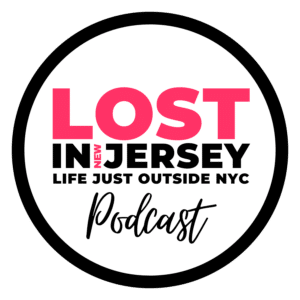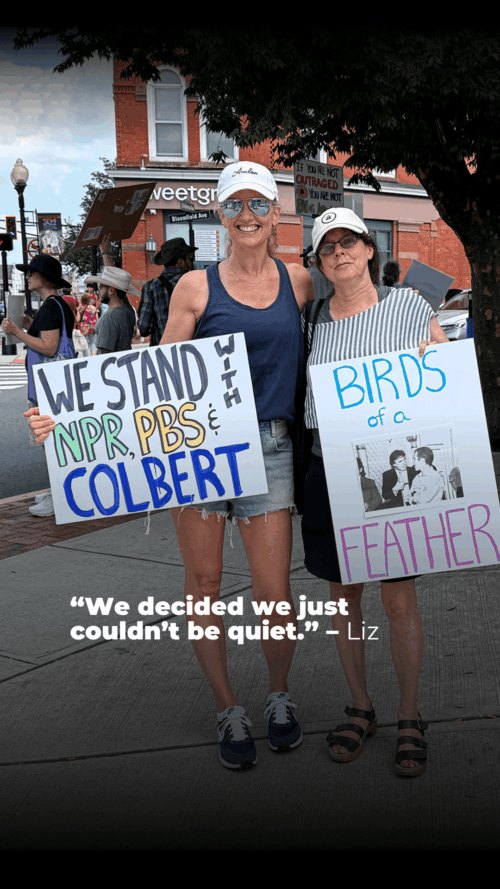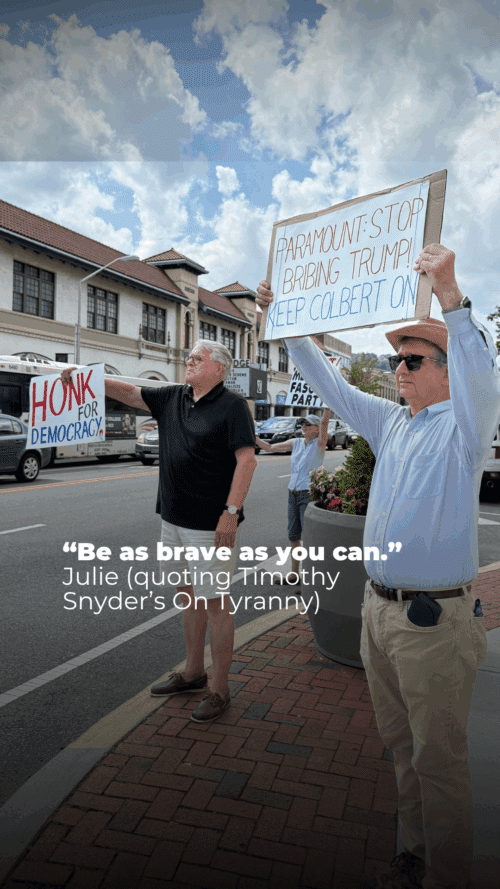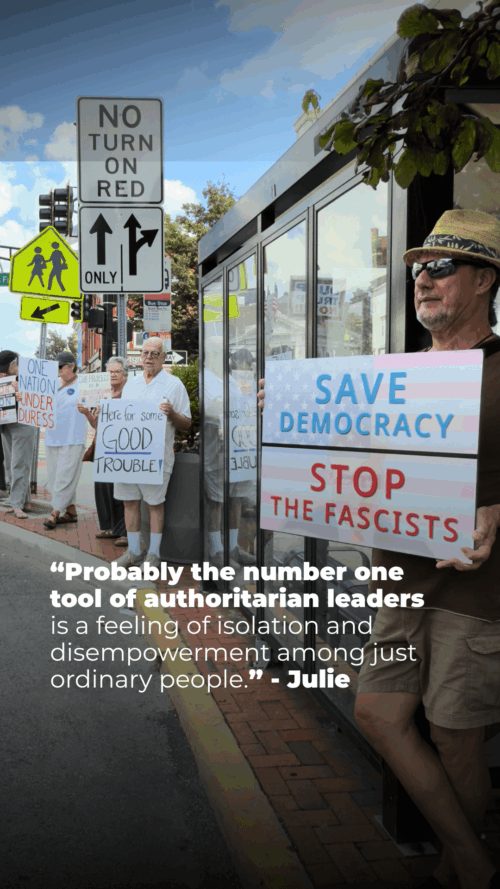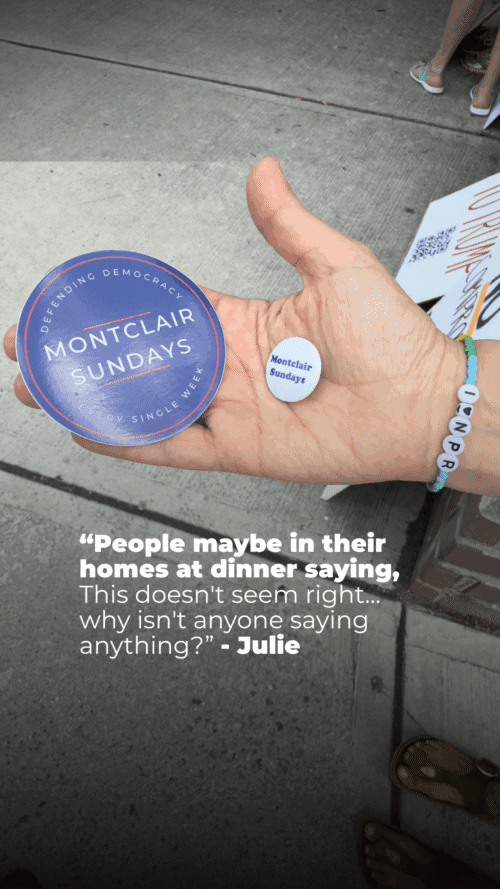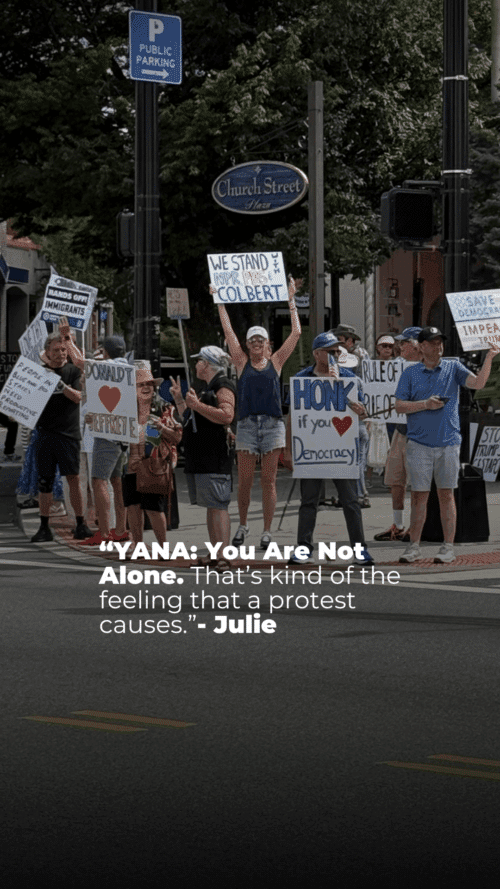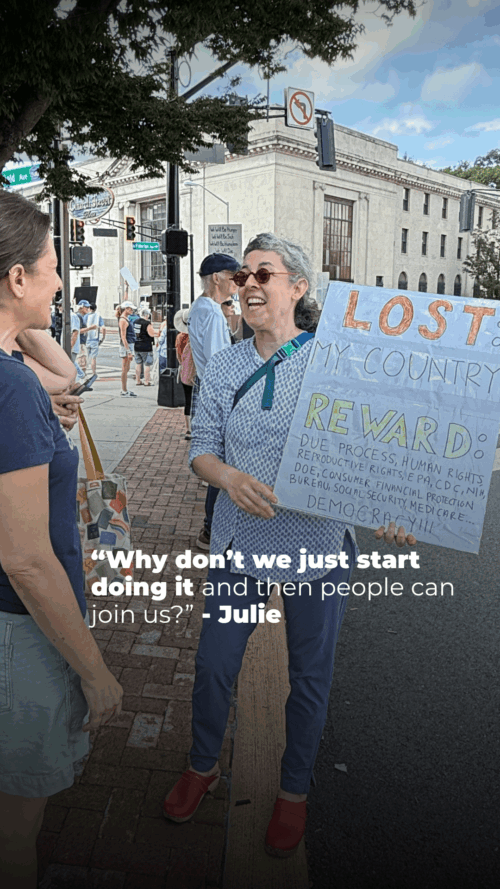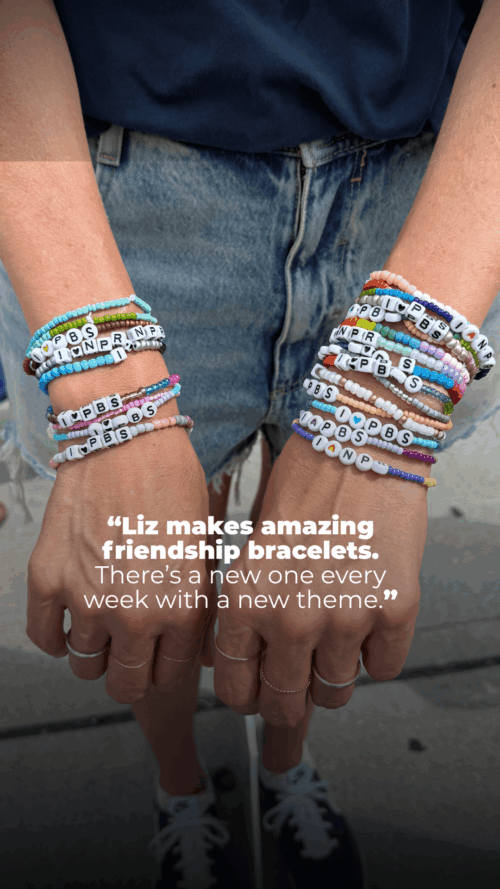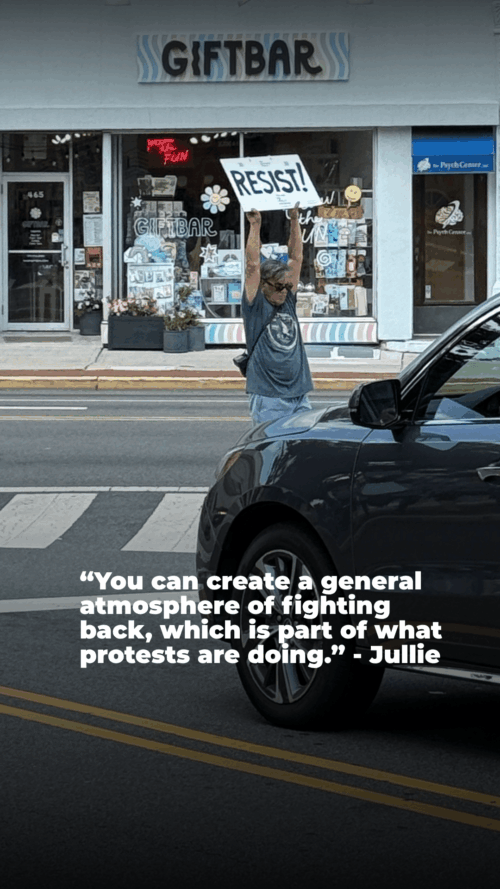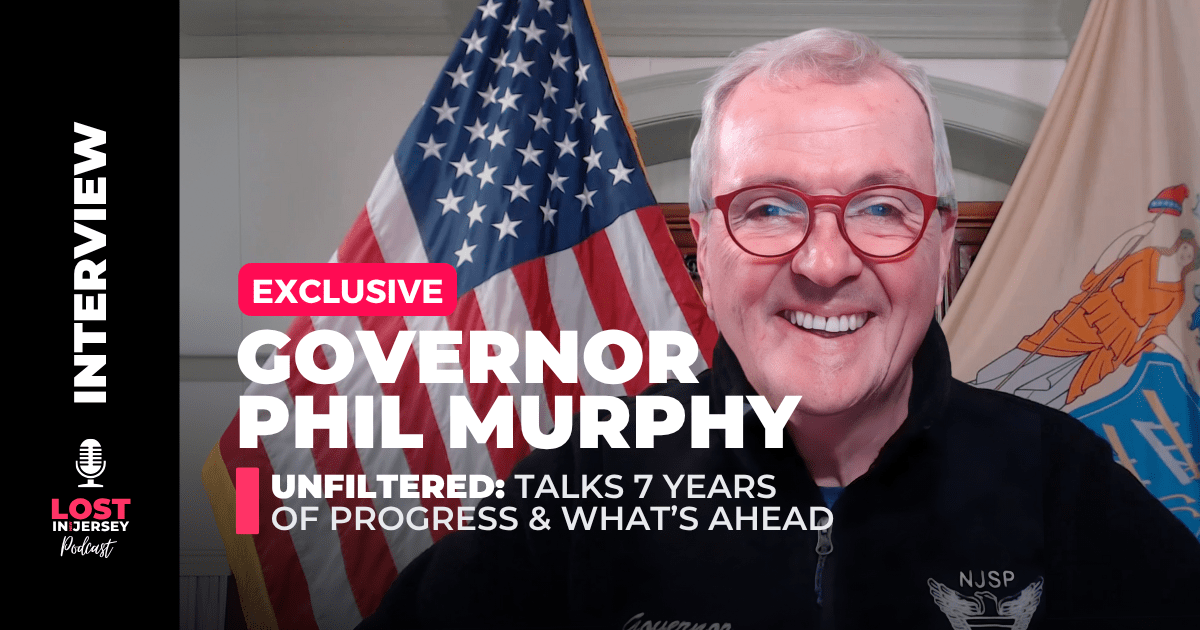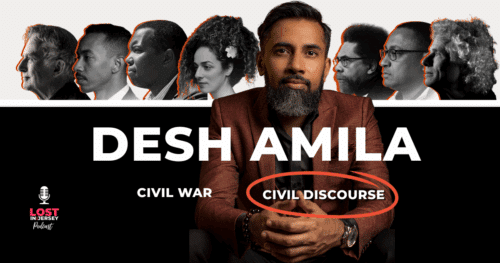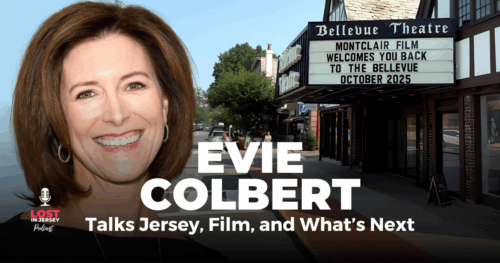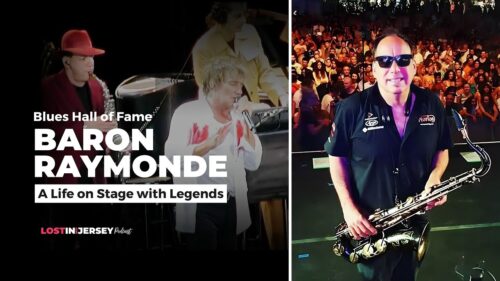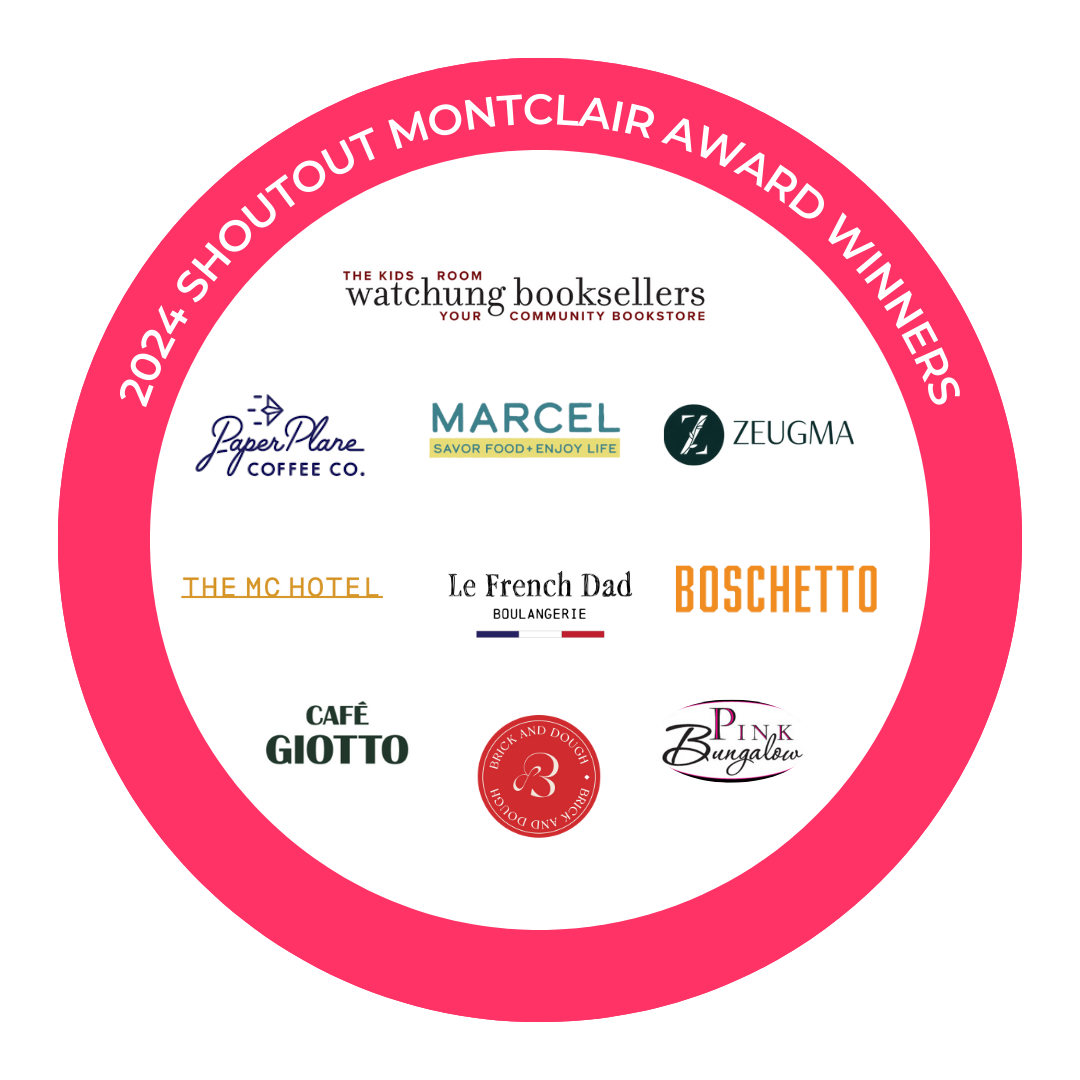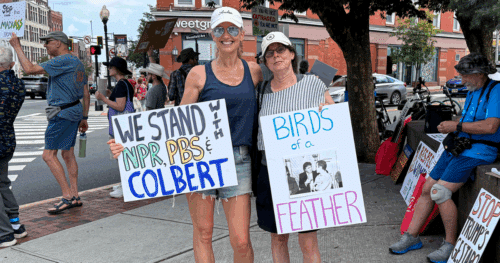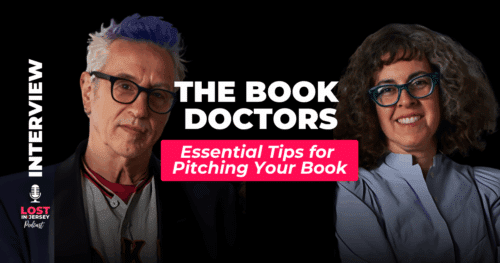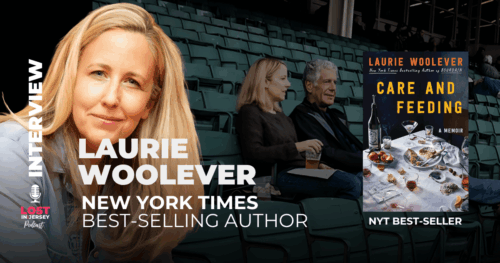What does it mean to protest in 2025 and does it still work?
In this powerful episode, we sit down with Julie Cohen acclaimed filmmaker behind RBG and Julia and her neighbor Liz Figenshu, a dedicated volunteer advocate. In the wake of growing political unrest, the two women found themselves walking the streets of Bloomfield, NJ, not just to clear their heads but to find a way forward. What emerged was a weekly protest that has lasted over 21 consecutive Sundays in Montclair, NJ. Montclair Sundays. Defending Democracy. Every Single Week.
However, this conversation extends far beyond one town or gathering. Together, we explore what it means to protest in the modern era and whether the tactics of past movements—such as marches, signs, and physical presence still hold power in today’s fragmented, digital, and deeply polarized world.
Julie and Liz reflect on how authoritarian regimes thrive on chaos and isolation, and why their rallying cry, “You Are Not Alone” (YANA), is both a comfort and a call to action. We speak candidly about our doubts: Do small, local protests really change anything? Are we shouting into the void? Julie and Liz share the surprising joy that has emerged—friendship bracelets, multi-generational connections, laughter in the rain as they’ve cultivated resistance rooted in community.
We discuss the long arc of protest history, from civil rights marches to the Women’s March, and ask: How do you keep showing up? What does resilience look like when news cycles move on, but injustice remains?
If you’re wondering how to channel your concern into action, or wrestling with whether standing on a street corner with a sign still matters this conversation offers honesty, perspective, and “micro hope.”
Because protest isn’t just about the moment it’s about the momentum.
100 years of protest. 100 years of persistence.
Some changed laws. Some changed minds. All remind us that showing up still matters.
✅ = Major goal achieved 🟡 = Ongoing or partial ❌ = Did not succeed
Here’s the list with icons in front of each bullet point:
- ✅ 1910–1920 – Women’s Right to Vote: Achieved the 19th Amendment through sustained suffrage protests.
- ✅ 1955–1965 – Civil Rights Movement: Led to landmark Civil Rights and Voting Rights Acts.
- ✅ 1964–1973 – Vietnam War Protests: Contributed to U.S. withdrawal from Vietnam.
- 🟡 1969–Present – Stonewall & LGBTQ+ Marches: Sparked Pride and fueled the modern LGBTQ+ rights movement.
- ✅ 2006 – Day Without Immigrants: Helped stop a harsh immigration bill with mass walkouts.
- 🟡 2010–Present – DREAMers / DACA Rallies: Pushed for DACA, with full legal status still sought.
- 🟡 2011 – Occupy Wall Street: Highlighted income inequality and influenced public discourse.
- 🟡 2013–Present – Black Lives Matter: Shifted public opinion and led to local reforms; national change ongoing.
- ❌ 2016–2017 – Standing Rock / No DAPL: Raised awareness, but the pipeline was completed.
- 🟡 2017–Present – Women’s March: Increased civic visibility and voter turnout, with mixed long-term policy impact.
- 🟡 2018 – Family Separation Protests: Opposed border separations; some policies reversed, others remain.
- 🟡 2018–Present – March for Our Lives: Youth-led movement for gun safety; limited federal change.
- 🟡 2018–Present – Youth Climate Strikes: Brought global attention to climate crisis; emissions continue to rise.
- 🟡 2020 – George Floyd Protests: Largest protests in U.S. history; some police reforms followed.
- ❌ 2020–2021 – COVID Lockdown Protests: Opposed mandates; most public health measures remained.
- ❌ 2020–2021 – “Stop the Steal” Rallies: Failed to overturn the 2020 election results.
- ❌ 2021 – January 6 Capitol Riot: Attempted to block election certification; unsuccessful.
- 🟡 2022–Present – Abortion Rights Protests: Massive protests post-Dobbs; some state wins, no federal reversal.
- 🟡 2023–Present – Gaza Solidarity / Anti-War Protests: Opposed U.S. support of war in Gaza; limited policy shift so far.
- 🟡 2025–Present – Protests Against Mass Deportation: Ongoing opposition to increased immigration enforcement.
Source Credit: This timeline is compiled from generally accepted historical records, academic analyses of social movements, and comprehensive news reporting on major U.S. protest events.
00:00 – Intro
01:18 – Meet Julie and Liz
03:40 – How a Walk Turned Into a Protest
06:25 – Standing on the Corner: What It Feels Like
09:10 – What Keeps Them Coming Back
12:42 – Honks, Hate, and Unexpected Support
15:35 – The Power of Being Seen
18:05 – Is It Making a Difference?
21:40 – Protest in the Age of Social Media
24:15 – “You Are Not Alone” and Quiet Courage
27:50 – Protest History: Civil Rights, Women’s March & More
30:10 – How to Keep Showing Up
33:00 – Closing Reflections: Hope and Momentum
35:20 – Outro and Where to Learn More
Janette (00:05)
Welcome everyone to Lost in Jersey. It’s so nice to have you back on Julie. We had a great episode with you before and Liz, welcome to you.
Rachel (00:10)
Yes.
Liz Figenshu (00:13)
Thank you.
Janette (00:14)
Julie, we know a little bit about you. Go ahead and introduce to our audience. Tell people a little bit about yourself.
Julie Cohen (00:19)
Sure. I’m Julie. I live in Bloomfield, New Jersey. I am a
documentary filmmaker in my sort of normal person persona. since November, I’ve also been a pretty busy, I would say anti-Trump activist in
Rachel (00:38)
Mm-hmm.
Julie Cohen (00:38)
my neighborhood and perhaps beyond.
Janette (00:41)
What documentaries would people know you from?
Julie Cohen (00:44)
Sure, people, the docs people would probably know best is RBG, which I directed and produced along with filmmaking partner, Betsy And other films include Everybody, My Name is Pauli Murray, and Julia, about Julia Child.
Janette (01:01)
And you know, I’ve seen all of them
Rachel (01:02)
All of them.
Janette (01:03)
and they’re all incredible. So if anybody needs to, you know, spend a weekend watching great documentaries that have some important messages behind them and educational messages, watch all of your documentaries. And I know that we had lunch recently and you told me you have some interesting things coming up. So everybody keep an eye out for what you’re working on.
Julie Cohen (01:04)
Miss.
Rachel (01:12)
Yes. Watch all of Julie’s because
Janette (01:23)
Liz, so tell us a little bit about you.
Liz Figenshu (01:26)
first I would like to concur about Julie’s films and you left out the Gabby Giffords one, which I personally find very close to my heart. So also check out that
Janette (01:32)
yes!
Rachel (01:32)
yes.
Janette (01:35)
He agreed.
Liz Figenshu (01:37)
So my name is Liz and I am Julie’s next door neighbor in Bloomfield, New Jersey. I am a mother of three boys who are all teenagers and all
than me. ⁓
Rachel (01:49)
⁓
Janette (01:49)
Yeah
Liz Figenshu (01:50)
And…
Julie Cohen (01:50)
And this is pretty tall to start with,
Liz Figenshu (01:52)
mostly I’ve focused on being a mom for the last years, but also I’ve had many different jobs.
Most recently, I am very proud to volunteer for an organization in Essex County called SAVE, we support survivors of sexual assault and violence.
Rachel (02:08)
Yes, that’s an
Janette (02:10)
first of
Rachel (02:10)
organization.
Janette (02:10)
this interview is focused around the work that you two have joined together to do, which is to bring awareness through
democratic cause, of how many causes? There’s so many. What is your specific?
Rachel (02:23)
Well, yeah,
what would you say is the mission statement, if you will, it would just be good for our listeners to understand how you guys got together, what was the motive and the mission,
then we can go from there.
Liz Figenshu (02:37)
So Julie and I have been walking as a form of exercise, a way to hang out and catch up for quite some time. as the election drew closer in November, more and more more of our conversations were political. We both have very strong feelings about the election and both did work ahead of time to try to help Kamala get the victory. And after the election was over,
Rachel (02:58)
Mm-hmm.
Liz Figenshu (03:02)
we were in shock and then once January came and he was inaugurated, it so quickly went downhill in a way that I was expecting, but the reality of it hit different than what I could have imagined. And Julie and I were both just appalled at the speed and the chaos and
harm that was coming to people.
Rachel (03:25)
Mm-hmm.
Liz Figenshu (03:26)
every day when we would walk, we would just be talking about it, talking about it, talking about it and wanting something to do. And we would look around at our community here in Bloomfield, Montclair. And we live in a pretty progressive community. a very diverse community and that’s part of the reason we love it.
Rachel (03:39)
Yes.
Liz Figenshu (03:41)
And all of a sudden we were like, where is everybody? know, aren’t the people that we love and care about in our community scared right now? And, and gosh, I’d love to get out there and say something and show some support. So we decided on one of our walks that we just couldn’t be quiet and we weren’t going to wait for somebody else to start something. So we decided to show up every Sunday from three to four on the corner of Church Street in Montclair and Bloomfield Avenue.
And historically that’s a, it’s a protest site that people know. So we weren’t looking to reinvent the wheel there. And, we decided the two of us would show up every single Sunday for an hour and we’d let our friends know and see if anybody else wanted to join in, but that, even if nobody else came, we could make our voices heard, make some signs, get out there, make some noise. And, the turnout was incredible. The first week we had 17 people and the second week, how many was it Julie?
Julie Cohen (04:32)
It
was around 100 the second week. we’ve been surprised, I think, by the consistency. There’s new people every week, but then there are really regulars. And I think the thought we had going in, like a lot of people, know friends that live in different places, a lot of people were saying in those early days after the inauguration, where are the protesters?
Why aren’t they, like, where is the protest? Where are people on the streets so that we can join them? And then it just sort of occurred to me and Liz, like, no, they are we. Like, why are we saying, why aren’t other people protesting? Why don’t we just start doing it and then people can join us? And our instinct felt like it really turned out to be true. People, as Liz said, that first week was not very many people.
Rachel (05:05)
Right.
Mm-hmm.
Julie Cohen (05:22)
but yet it felt like something was happening. The people that drove past and the people that walked past seemed, and this is in February, so it really was before there had been anything in terms of big protests. people seemed
or even moved to see us every week that we’ve been out there, and it’s now been 21 weeks. There are people that cry when they see
Rachel (05:46)
Wow.
Julie Cohen (05:46)
just
because they’re happy. mean, a good acronym that one of our protesters, an elderly guy named Bob shared with us from something that he had read was, Yana, you are not alone. And that’s kind of the feeling that a protest causes. Like you can feel very isolated in your opposition to a powerful regime, which I think is what we have.
Rachel (05:59)
Mmm.
Yeah.
Julie Cohen (06:11)
going now and if you look at and read and listen up about the history of authoritarian takeovers in various countries you’ll see that probably the number one tool of authoritarian leaders is a feeling of isolation and disempowerment among just ordinary
People feel alone and isolated. People maybe in their homes at dinner are saying like this doesn’t seem right.
I don’t really like people being grabbed off the streets by masked people who don’t identify themselves and then put into a vehicle without due process and taken to detention. Like that seems bad. why isn’t anyone saying anything? And then, so you feel really isolated in that personal reaction. But when you see like, no, actually many people in my community feel this way. Hey, look.
Rachel (06:52)
Mm-hmm.
Julie Cohen (07:02)
There’s a hundred people on the street every week who are saying that. And listen, people that drive by, like half of them are honking extremely enthusiastically, sometimes taking pictures or videotaping the fact that protesters, are putting them up on social media saying I’m glad to see that my neighbors, that my fellow humans also don’t want to just stand by and let this all
Rachel (07:15)
Mm.
I think that you are not alone is really exactly it. I mean, just from the protests I’ve been to with alone or with my family or with friends over the many, years of
there is
of a collective feeling of community when you’re marching down either in Washington or wherever you are with like-minded people. I think
that’s a really important point to make.
Liz Figenshu (07:52)
One of the unique pieces of this moment is that we’re out there and I think the common thread is the Trump administration is what we’re protesting against. But within that, there are so many facets of things that people are wanting to protest. And so everybody has the different thing that puts them over the line and says like, no, I need to get out there. I need to speak up. we coalesce around the,
Rachel (08:08)
Hmm.
Liz Figenshu (08:17)
the Trump administration being the main problem. But it’s interesting because like you were saying, individually, those pieces, you could feel alone in any of those pieces if one issue is like really your issue. But we come together,
Rachel (08:30)
Mm-hmm.
Janette (08:31)
Well, we’ve had a lot of discussion, Rachel and I, leading up to this. And it’s hard to articulate everything that we’re thinking because I feel like we’re coming from an average person that comes from a democratic background that also was out there.
at the very beginning in 2016 at the women’s movement march and just were blown away with the turnout and the amount of people that showed up, continued to protest into the next one and then the next one also went to the Black Lives Matter protest, then started getting a little disillusioned with some of the protests that were starting to happen that seemed to be almost
some of the protests that I went to, I actually told Rachel that I wish I did not participate in retrospect, that they felt like they went too far in some things. it’s been 10 years almost of protesting for various issues as you are saying that people are now just coalescing under like one big, know, have many different things that you’re upset about.
And the thing that’s frustrating in looking back at all of these protests is that the legislative output from them has been primarily negative for the cause that you are out there in the street for. And the question is, are they working? Is our protest working in the new environment that we’re in, in the way that we need them? We know that we want to not feel that we’re alone. And in the past,
it seems that protests were working, that they had, you know, we’ve seen, we can look at the civil rights movement, the Vietnam War, and also some countries that have had protests that have led to change. the question is, am I just not willing to play the long game of 10 plus years?
Julie Cohen (10:14)
Yes,
I have to fight back against your history here. And I think the American Civil Rights Movement is probably quintessential one to look at because it’s history that’s so familiar to so many of us. But that history gets really crunched when you look at it at hindsight.
Rachel (10:17)
Yes, please know we’re at we’re at we want to have a conversation. Yeah.
Janette (10:17)
Yeah, that’s what I’m asking.
Mm-hmm.
Julie Cohen (10:39)
not like Martin Luther King and people went out there one day and then the next day there was like, hey, let’s do a Voting Rights Act. Let’s do a Civil Rights Act. No, this is years and years of hard work, sustained action, which seemed for a long time like it wasn’t gonna make a difference.
Janette (10:39)
like a year.
Mm-hmm.
Julie Cohen (10:56)
And then until it did make a difference. mean, to use…
Rachel (10:57)
And then it’s it. Yeah.
Julie Cohen (10:59)
to use a protest movement from another country, I think the great Nelson Mandela quote is like, things always seem impossible until they’re done, until they happen, but there’s like, there was a lot, if you look at any movement in this country or others where people have fought back and may change and that fighting has include people going to the streets, there is a long, long period of it seeming like, this isn’t working. If the people that were protesting gave up,
Rachel (11:06)
Right.
Julie Cohen (11:25)
when it didn’t lead to immediate action,
civil rights movement would have never had the great successes that it had. Not that everything changed for the better and certainly not that everything changed forever because some of those things are starting to erode even right now under the Trump situation.
Rachel (11:31)
Yes.
yeah. Yeah.
Julie Cohen (11:42)
when you look back on movements, you look at a few iconic moments.
And you think like, oh, look, they did that. Look what a big difference it made. I mean, when Martin Luther King in August of 1963 went to Washington and did the I have a dream speech, he had already been doing sustained, organized, often very small protests all around the country for more than a decade at that
think the Civil Rights Act was 64 and the Voting Rights Act was 65. So there’s still another couple of years before the big legislative victories happened. But like that big, visible, everybody notices President John F. Kennedy, after trying to make it not happen, sort of flipped around and like, oh, yay, this is good civil rights.
did not come out of nowhere. That came out of small community-based
issue-based movements all over the country, including with the national leadership pushing and fighting and trying to make it happen for years and years and years. It’s only in hindsight that we think like, look, they protested and it worked.
Rachel (12:44)
Well, I have a question then. Like there are many layers to getting rid of a government or getting people to, vote a different way. So if you’re looking at it, then protest one way that has to go with all these other
I’m hearing you and I am definitely seeing like, yes, you’re right. Looking back in hindsight, it’s, it’s hard because of that time
So that’s the visibility factor and along with social media, which we wanted to ask you about too, how that’s changed protesting and movements
All the other things that need to be in play in order to get the change to happen, So what are those other things that you would encourage people to do besides or along with?
being out there vocally protesting so that the rest of the world sees that we’re not complacent.
Liz Figenshu (13:30)
one of the parts of our, what we do every week is we send out an email, on Mondays to thank everybody who was able to show up and also to offer some suggestions about what they might be able to participate in that week if they were interested in some additional activist activities. And obviously those include things like calling your, representatives and those calls do matter
When Cory Booker did his speech that was 20, however many hours and broke the record, he specifically said, my constituents pushed me to go outside of the normal and come up with a creative way to, to make my voice heard. And, I was calling every single day still am. And so I think he spoke directly to us to say like, yes, keep this up, keep this up.
Rachel (13:56)
Mm-hmm.
25 I think
Liz Figenshu (14:19)
so, and while that one speech in and of itself obviously didn’t, you know, solve everything, but these are all steps. They’re all building blocks on which we are building the resistance and the ability to, as you’re saying, finally change leadership.
Janette (14:36)
I think we’re all have the same ultimate goal, We all are upset with what we’re seeing happening on many different levels, the authoritative, grasp of power that is happening now that seems
I feel like for just speaking on behalf of someone who was going to protests and was actively there, that there’s, I would say, I need a moment. I was texting this to Rachel, I’m afraid of taking the moment to rest and say, I have to get some clarity of what’s going on. Why is it that the Republicans who are not known to protest?
They did have one tragic protest of January 6th, which almost took them down. I mean, so many people were against that protest,
But what did they so cleverly do? To be able to gin
up their support from that tragic protest.
And I’m just taking this minute to say, what exactly do we need to
And I’m afraid of that minute because as you know,
when you’re in an authoritative place,
you don’t protest for fear of something being taken from you. it’s like the only people that can protest now have, haven’t check that box hasn’t that they may get in trouble.
Julie Cohen (15:49)
Well, you know, first of all, I think it gets complicated. It’s funny that you’ve used the word democratic and a number of times, and I’m never sure whether you mean little D democratic or big D like the Democratic Party. mean, I actually feel like a fair amount of what we’ve done is kind of in both those directions because we are registered Democrats. like to me, the big issue right now is
Janette (16:02)
more like the Big D Democratic Party.
Rachel (16:07)
Mmm.
Julie Cohen (16:12)
is the little D Democrat issue and
Janette (16:15)
Mm-hmm.
Julie Cohen (16:15)
trying to get as broad a tent as possible that stands behind some of the kind of key principles in our nation. I think your fear question is a really valid point. And I think Liz and I both spent some time early on in the world that we live in with the Trump second
Rachel (16:23)
Right.
Julie Cohen (16:38)
presidency, which both of us viewed as much scarier than the first time around because they seemed to be as truthfully the big D Democrats warned like there were going to be fewer guardrails this time around because they planned for it. That’s absolutely true. I wasn’t protesting all the time. And the first thing I went to the march with the pink hats the first time and then I went on with my life. This seemed different.
Rachel (16:42)
The first one. Yeah.
Julie Cohen (16:59)
But one thing that we did from reading up, and a good example that a lot of people have read and I’m among them is the Timothy Snyder on tyranny book, which is a good short little book citizens respond to authoritarians and and fascists. And one of the things that he’s got like 20 points that he lays out of what you should do. And one of them is
Rachel (17:19)
Mm-hmm.
Julie Cohen (17:23)
Be as brave as you can. And I really like that sentence because it acknowledges that different people have different levels of and that we should all act accordingly. True, I guess for something like this, I will speak only for myself personally, but like, I understand that I have a certain amount of privilege in American
Rachel (17:27)
Hmm.
Right.
Julie Cohen (17:45)
which puts me not at zero risk, because I actually think everyone’s at risk right now when they speak out, but like at maybe less risk than some other people, certainly because I’m a US born US citizen and some other things. Like I’m not saying I would be going out on the streets if I felt like I was more vulnerable in certain ways, but because I’m a little bit less vulnerable, I kind of feel like it behooves me to be speaking up.
on behalf of people who might be more moderately or even highly vulnerable.
different risks and also the risk is gonna change over time.
if I’m not being brave now, I don’t know how I’m gonna be brave a year from now when there is situations where they’re starting to arrest people just for speaking out against Trump, which I do think is gonna happen.
if you can go arrest or, God forbid, beat up like 10 people, once there’s 100 people, it becomes a little harder. Once there are 10,000 people, it becomes really hard. the more people who feel less vulnerable, the more of us join together to speak out, like kind of the safer and less risk.
Rachel (18:41)
I see.
Mm-hmm.
Julie Cohen (18:51)
less risky like all of our actions are?
Rachel (18:54)
Right.
Janette (18:55)
do believe that protests are helpful to find that you are not alone type of feeling. But I also worry that protests in a social media environment are being used as content to be mis-
represented and used to push policies that promote the Republican machine of some sort. That they are able to take small pieces and just misrepresent it or represent it accurately, but projected upon a whole entire them versus us type of
Rachel (19:18)
Trump administration, yeah.
Janette (19:35)
I don’t know exactly what’s going on with the big D Democratic party. I do know that I had never in my life said that I would leave the Democratic party, but at this point I’m starting to move inching to independent, which I’m shocked to say that. I never thought I
Liz also, I want to ask your opinion on this step because I feel like I’m bringing
pressure points about this topic. And I’d like to be pushed back on and help me have hope, you know, that yes, I should get out there. I should try. I should do these things. But I’m at a point right now I’m like, they’re doing something and we got to figure out what they’re doing. It’s not this, and maybe it’s not nice, whatever it is they’re doing, but we got to do it.
I feel like we’re we’re being It’s not the word Pollyanna, but too I don’t know. I’ll stop there, Julie.
Rachel (20:24)
No, I’m so glad you
Liz Figenshu (20:24)
Yeah
Rachel (20:25)
just shared all that thought process
Liz Figenshu (20:27)
I have so many friends who feel the way you do and hear these kinds of these concerns and thoughts all the time. And I don’t think either Julie or I would say we have the answer. But I would say that by doing
Rachel (20:38)
Hey.
Liz Figenshu (20:41)
something is important. Nobody can do, not one person can do everything, but everybody can do something.
And so maybe protesting is not your thing, but I would say part of how we ended up in this situation, in my personal opinion, this is speaking for me, is that civic engagement is just so low in our country and we have taken for granted the rights that we have in this country. And I think that at this moment, there’s a slide into authoritarianism and it’s a process.
The further to your point, every, every day gets worse. Right. And so the further we get down this slide, the harder it’s going to be to get ourselves back up. And so it’s now we need to act now and protesting is, is a small part of it, but, you know, Amanda Littman run for something. People need to get out there and get involved in their local government, you know, and, and run for local office. People
Rachel (21:19)
Mm.
Liz Figenshu (21:34)
don’t think about how important those local offices are. And when it comes to elections, those happen on a local and state level. So those are the people who are going to be, very important in 2026 when, when it’s time to, count the votes and are these elections fair? And, there’s building blocks that have, I think, been taken, taken for granted. And we, as citizens of the United States have
Rachel (21:37)
Yeah.
Liz Figenshu (21:58)
gotten to a point where we think this, freedoms are free. Our freedoms are free, but no, need to pay for them. And we need to pay for them through work and diligence and getting involved ⁓ and 100 % engagement. the thing too is the Supreme Court and courts in general, the Supreme Court though will take up cases.
Rachel (22:13)
engagement. Yep. And
Liz Figenshu (22:21)
based on what they see as people really want to be dealt with. They can’t take up all the cases, so they choose which cases they’re gonna see. it affects them when they see people out in the streets about a certain issue, that’s one that’s like something really important. And at this moment, the Supreme Court, I’m not a fan, but some of the decisions they’re making, but I do think that overall,
Rachel (22:28)
Mm-hmm.
Liz Figenshu (22:45)
the visibility, we need to keep pushing back and keep amping it
And whatever sort
potion that like you alluded to, the Republicans are using in their dirty games, they’re always gonna find a way to do that. Whether if we protest, they’re gonna frame it in a different way and say whatever, or if we sit at home, then they’re gonna say nobody cares.
There
way to avoid
their playbook and the way that they want to handle things. I don’t think it’s being Pollyanna of us to
and to use our voices and to use the rights that we still have while we still have them to get out there and make our voices heard. And I a hundred percent agree with Julie. think at some point, protesting and using our first amendment rights is going to
come under a new level of scrutiny and maybe even be made illegal. the word terrorist has been thrown around with people who speak out against the government as Trump is trying it out. And I feel very much like my privilege. I am a white lady. I have an hour in the middle of the day to sit here and talk to you fine people because I’m not out working for jobs to feed my family. I feel like it is on me.
to be out there and be the front lines. If they’re gonna say that I’m a terrorist one day, want it to be, say that I’m a terrorist because I think what has been scared into people about, terrorists and whatever, this is not what they picture. So I’m happy to be out there on the front line and
a concerned citizen. If you wanna call me a terrorist, you can, but you’re not gonna be able to get away with your othering of people.
in the way that you have in the past because of their skin color, because of their religion, because of whatever, if I’m there in the front with all of my privilege and saying, is problem and we all agree here. And I do think it’s also important that we do risk something. I understand the desire to not wanna speak out, to not wanna ruffle feathers. I have certain things that I don’t feel comfortable.
sharing or whatever, the fact that we have to risk something. This doesn’t come for free. And putting my own, I’m willing to put my body on the line and be out there. I’m willing to put my face on the line. And that’s me. Other people will do other things. Julie, for example, I don’t know if you know this, but she, with Columbia, she did an incredibly brave thing and it had a cascading effect. And because she stepped up and spoke out and
Rachel (24:47)
Yeah, right.
Liz Figenshu (25:09)
Decided that she was not willing to be a part of something that was happening. That was not okay other people followed her because guess what they they maybe wouldn’t have if she didn’t at first but because she stepped up it does have an effect if you speak out then somebody else feels more comfortable and for me personally too, I feel so that our weekly protests are important because we’re flexing that muscle we are using that muscle every week to get out there and engage civically and
Rachel (25:11)
Mm-hmm.
Liz Figenshu (25:36)
also I think that there’s a lot of people who protesting sounds scary or it sounds like something that they would have never do. But when they see us out there every single week, and let me tell you, when we’re out there for one hour, we actually have fun. And it’s like, it’s bizarre to think it’s a horrible reason we’re out there, but we make it fun. And we, I think we’re sort of making it slightly less stigmatized.
Rachel (25:44)
Mm.
scary. Mm
I
article about you guys in the Montclair Local and I liked how you said, if you’re uncomfortable talking to someone at the other end of the phone when you call, call before the office opens and leave a message.
Julie Cohen (26:11)
Right.
Rachel (26:11)
I’ve been in shock watching what is happening, thinking how can it get worse? And then also trying to manage my own family and taking care of kids and trying to not be so negative about all the issues that I care about that are unraveling that I’ve preached to my kids are so important.
know, it’s hard when you feel is hard and how to, how to feel like, okay, if I just start picking up again, just a little at a time, just start making calls again, you know,
Liz Figenshu (26:43)
It
is the antidote to despair, I assure you. And every single week we feel it, we hear it from everybody who comes. Everybody who comes tells us how grateful they are to just have that hour. It’s almost like we refill our tanks for the
Rachel (26:46)
Mm-hmm.
Liz Figenshu (26:56)
we’ve seen people come by the protest, like Julie said, in tears. Last week, a kind man saw us all out there sweating, and he brought a case of water and brought it around to everyone and offered water. And he said, I’m from Columbia.
And when I see you here, it fills my heart.” And he started crying. I think it just brings a level of hope and it spurs people to feel like, okay, I can do this. I can go stand there. Okay, I can do this. I can make a call. Okay, I can do this. Maybe I can run. Maybe I can volunteer in this way. I can step up in this way. I can go to court for an immigrant who’s going to court and be there as an observer for them.
There’s a million different ways to get involved
Rachel (27:32)
Thank you.
Janette (27:32)
You know, I’m listening to all of this and I have so much hope that protesting can grow into something that would actually create a change. And my question is, I heard you say earlier that people pay attention when there’s noise or, you know, we live in an attention society. It’s all about…
getting attention and you know, who’s got the attention and it shifts very fast, of course, you know. So you said earlier that when people see people protesting that the Supreme Court or the courts pay attention So I definitely agree with that, you know, that I do think that there being attention on a topic
definitely causes interest. However, the topic has become 30, 40 different topics like what is the overarching
Julie Cohen (28:20)
Jeanette, you’ve referred a couple of times this in this conversation to sort of the perplexing, horridness of the right wing tactics right now. And one of their main ones is the so-called flood the zone, like do so many bad things all at once. like everyone’s thrown back thinking like, my God, how do we defend against all of this? But like, I think one
Rachel (28:35)
and see what sticks. Yeah.
Julie Cohen (28:42)
answer is that just because you can’t actually defend against everything doesn’t mean that you should do nothing. I mean, that’s what they’re trying to do with their flood the zone tactics. They’re trying to make it so hard to, you know, there’s so many things to fight back against that, yes, you can’t fight back against everything. But first of all, you can create a general atmosphere of fighting back, which is part of what protests are doing, whether they’re
Janette (28:51)
Mm-hmm.
Rachel (29:04)
Right.
Julie Cohen (29:07)
small, think particularly sustained regular ones like the ones that we’re doing or these sort of larger protests that have been happening every month or so. So it creates a feeling among just regular citizens that are going past, I’m like, actually people are staying something. are standing up. But there’s also, picking some targeted things to
standing up for the people who are most vulnerable. I mentioned Timothy Snyder’s on on tyranny before and what another one of his 20 is the first targets. and there’s all kinds of reasons for that. Like when a new regime that’s trying to create a whole new system where they have much more power at the top than has ever been
before in the country they’re in, like what we’re experiencing right now with Trump too. One of the things they do is like, let’s go after really vulnerable people who a lot of people don’t like anyway, and we’ll attack them and we’ll see how far we can go. We’ll see if anyone stands up for them. If they don’t, then we’ll broaden it and do it to the next group. So one reason to protect, and in this case, just to be, you know, specific, like when I first read that book in…
Janette (30:03)
Yeah.
Julie Cohen (30:13)
you know, November, we weren’t sure who were going to be the first targets. I think it’s turned out that the first targets are immigrants to this country. I don’t even want to say undocumented because they’re also going after people who were in this country legally, but then they strip away the legal protections.
Rachel (30:26)
Yes. Yes. Yes.
Julie Cohen (30:30)
immigrants to this country is one and the other, which is sort of a, seems like a really
group to pick just because the small percentage-wise is transgender people. So the administration is going to decide it goes after these people, thinking like, yeah, no, people always are negative towards them anyway. Overall, our polling shows that people, the polling last fall was like, people are really concerned about people in this country illegally. I know because I did a lot of door-to-door canvassing for the Harris campaign in Pennsylvania, and I will tell you,
that issue came up more than any other by a mile. People saying they were concerned and it’s not actually clear to me how much people in Pennsylvania illegally were actually causing problems for the citizens in Pennsylvania, but they had it in their head that it was a problem. They’d seen a lot of stuff on TikTok that told them it was a problem. So they thought it was a problem.
Rachel (31:05)
Yeah.
Yes.
Janette (31:21)
Mm-hmm.
Rachel (31:22)
Yeah.
Julie Cohen (31:23)
And, you know, same thing with the trans sports issues. Like, honestly, whether a trans person in high school can play on the sports team, that is not the gender they were assigned. Is this really like a major national issue? Is this really, how many people’s lives is this impacted? But they got people.
Rachel (31:29)
Right.
Julie Cohen (31:41)
very fired up about it And I think there is an interesting dilemma that hits people who are trying to protest of the saying I don’t necessarily want to stand up for trans people or for immigrants to this country because like they’re not that popular and we’re trying to like, we’re trying to have like a big 10 and we’re trying to win over for the Democrats in the next, you know, in the midterms or whatever.
When I hear that argument, all I can think is, you know, I’m Jewish.
went off the Jews because a lot of people didn’t like Jews. like
Rachel (32:12)
Or are they just?
Julie Cohen (32:14)
made a poster for
first protest that said trans rights or human rights, it was because I was thinking if someone was trying to argue against Hitler in the thirties, I hope they wouldn’t say like, except I don’t really care about the Jews that much because people don’t really like them.
one reason is to protect the individual groups that are being attacked, but to protect against this erosion of a plan to just broaden, like, you know, he’s seeing what he can get away with.
Rachel (32:38)
Right, I mean, I think you brought up so many good points in that
is also when you’re like, cause I also spoke to people that were like, well, I’m really afraid of, you know, the immigration and, or the illegals, they’re, you know, violent and that sort of messaging that MAGA does to get to people who aren’t affected by any of this at all. But then they feel like, Ooh, I should be terrified. This is my number one concern.
Same with the trans stuff. It’s like, well then should we as a collective be broadcasting the normality of these beautiful immigrants and document your undocumented trans and just sort of, I don’t know if radical empathy is the right term. And I don’t know, that’s also been like every term that comes up gets co-opted in a terrible way, but like
it is empathy.
It is saying, hey, we just all want freedoms for everybody. End of story, have a good day. Like how can we present in a national, level our values in a simple way that could possibly affect people to see, wait, this doesn’t affect me like that. It’s not affecting me at all. I want them to have a good life. I want to have a good life.
I don’t know where that’s getting lost. Why is that not all over social media? It can’t just be that we’re addicted to rage as a culture, but it feels like that. I don’t know.
Janette (34:02)
just want to answer that from being a Southerner also, know that there are bigoted, homophobic, racist people everywhere. Right.
also just from having experienced growing up in a very conservative religious
Those people are not all of that. They may have some misunderstandings about certain things. They may have some slip ups of like saying some sort of some not PC thing. But in general, people are really good and they’re wonderful people. They may be Republican. They may not support the same things that I support. They may not believe in some of the things that I believe in.
But all in all, they’re going to help you when you need your help. And they’re going to help everyone no matter what it is. when we’ve gotten to a culture where we’re othering, and I’m doing it, I do it as well. know, that we othering, it’s just like a default now. It’s them, why are there not values? Why isn’t everybody values like my values? think, I don’t think that the Republican party in the big R or far right,
want us to be an authoritarian. They don’t want us to lose our freedom of speech. They don’t want any of this stuff that we’re also afraid of. And I’m just wanting us to somehow find a way that we can all come together and say, look, we want this country to be free. stop all this scaring of people, scaring people of immigrants. Yes, I feel like things need reform in all areas. need some things are a little broken and some things are a lot broken.
I think that I do love that you are taking a positive way forward of all of this. And I want to be part of it too,
I don’t know what to do anymore, but I feel like something is broken. And I guess that what you’re saying is the only thing that you can do is go out there and be a beacon of light, a beacon of hope to people that are scared.
I feel like there’s no power behind the Democratic Party that we’re screaming, we’re demonstrating into like the wind.
I’m sorry, you’re hearing my frustration in the way that I’m exhibiting it. I’m sorry. But then I’m going to try to channel it into what you’re doing and I’ll stop there.
Rachel (36:14)
No.
Janette (36:17)
Julie, your take. Can you close us out on what you think that has come from this crazy conversation?
Julie Cohen (36:24)
Yes, think we’re going to consider, Liz and I are going to consider this conversation a success when we see the two of you ⁓ at our protest, even as observers, if nothing else, because a lot of concerns that you’ve raised, I mean, a lot of them are fascinating and valid, but a lot of them also might be completely eased and
Rachel (36:33)
Mm-hmm. Mm-hmm.
Julie Cohen (36:49)
you might find a little bit of illumination and even hopefulness in watching the vibe of people from, and people actually come from different areas around. We didn’t expect that maybe. We thought everyone was going to be from like a two mile radius, but no, people have traveled to our protest because they’ve heard about kind of the vibe of it.
I mean, we’ve actually had Ukrainian people who don’t speak any English who we can only communicate with through Google Translate and seeing how people sort of come together and almost are standing up for one another in this, that we’ve created. mean, Liz makes amazing friendship bracelets. So there’s a new one every week and we, with a new theme every week and
people are like so happy just to be getting something like to getting a message. And everyone says they wear, they picked out two or three of them to wear every day. And then that leads them to having conversations with people they meet about what the bracelet
Rachel (37:41)
Mmm.
Julie Cohen (37:44)
like there’s
word we’ve I’ve been using is like micro hope.
you’re so bad right now that it’s actually hard to build
is micro hope. And that’s what we’re every Sunday at three o’clock at the corner of Bloomfield Avenue and Church Street among like.
Rachel (37:51)
I like that.
question, has anyone brought a sign that you’re like, no, you can’t use that.
Julie Cohen (38:02)
Okay, so there was a guy, there was a young guy who was like screaming with the F word in front of every, and he was there before, he didn’t know really about our protest, he was just there before it started, and a lot of our protesters are elderly, so we’re like, how’s this gonna go? But it was like beautiful, this 20 year old kid who’s screaming like.
Janette (38:02)
That’s good because…
Liz Figenshu (38:03)
Wait,
am I forgetting something?
Julie Cohen (38:24)
F this, F that, and his sign said F this, F that, starts talking to like some 85 year olds who were explaining to him what, how they felt and what some of their signs said when they were protesting against the Vietnam War. And they started, and he said you know what, I’m really angry and I’m really scared. And everyone’s like, you know what, I can understand that. And then there was this really meaningful multi-generational conversation.
Rachel (38:36)
Okay.
That’s beautiful.
Janette (38:48)
when you were talking, Julie, and Liz, I want to get to your closing thoughts too, is that I really had this moment of an epiphany in this conversation, is
think I’m correlating so much protest with a result. And with a tangible result, I want to see it. And all I’ve been seeing is, you know, like bad stuff happening, right?
Rachel (39:06)
Yeah. Yeah.
Janette (39:14)
just realized that it’s maybe just part being part of something that is
like,
You’re okay, you’re not alone. Not everybody is happy with what’s going appreciate that takeaway I have gotten, so you actually might see me.
Rachel (39:31)
Mm-hmm.
Janette (39:35)
Liz, what are your thoughts?
Liz Figenshu (39:36)
Well, one thing I want to say, this is the Lost in Jersey podcast and I grew up in Jersey. I am a Jersey girl through and through. I actually grew up in South Jersey, not too far from the beach. And so I’ve had many different Jersey experiences, more rural. I’ve lived in Union City, more urban. Now I’m in the suburbs. And I love New Jersey. New Jersey gets a bad rep.
in a way that I think is hilarious. And I think now it’s moved on to Ohio. I think they get the better of now. My kids, my kids told me.
Janette (40:04)
Do they?
Rachel (40:05)
know we passed the baton. I’m glad.
Janette (40:07)
We need to move to Ohio
and do a Lost in Ohio now. Help them out.
Liz Figenshu (40:11)
Yeah,
Julie Cohen (40:11)
you
Liz Figenshu (40:12)
my kids told me that Ohio is the butt of all the jokes now. I’m okay. But they’ll, I’m sure it’s lovely there and that they’ll have their moment too. But I feel so strongly that New Jersey brings together so many different kinds of people, red and blue, immigrants and people who’ve been here forever and
Julie Cohen (40:15)
you
Rachel (40:15)
That’s funny.
Janette (40:15)
⁓ okay.
Rachel (40:18)
It’ll just pass on. Yeah, it’ll pass it along.
Liz Figenshu (40:33)
so many different kinds of people with so many different ideas and there’s artists, there’s business people, like, you know, and I know those things exist everywhere, but in New Jersey, I think partially because we’re such a densely populated state that you feel it. I feel it. And, and I do think that there’s ways that we live in a bubble because we have been protected from so much. when I, when we see what’s going on in LA, it just, that feels so foreign because
I don’t think that could happen here in Jersey yet. And so I do want to utilize this time that we have and hopefully our rights will not be taken from us in that way. But I feel like it’s so important for us to be leaders out there. Like I literally am talking to New Jersey legislators about, what can we do, you know, the different things that we can do to step up our game and and be a leader within the country.
And I know that you see, Jeanette, all the news is terrible every day, every week, every day, more and more and more. There are so many wins that you don’t hear about because they’re not as clickbaity. But there are so many wins behind the scenes of people doing things that are so courageous and so important.
and standing up and the more people can do that and the more we can tune into that, the more we can build upon what we’re doing here. And Erica Chenoweth is, you know, the 3.5 rule, she says that,
Rachel (41:58)
Yes,
Liz Figenshu (41:59)
you know, with
regime cannot stand if 3.5 people, percent of the population are actively engaged in fighting back. And so,
What we believe is that our weekly protests are, we are building that muscle of engaging people and it’s one form of engagement. And the more people we can get in, the faster we can get to that 3.5 number. And, know, Julie and I are so proud that people in other parts of the country have started weekly protests because they heard about ours. And so we are building this thing slowly, but surely. And, you know, the bracelets, I’m a Swifty, but that’s where it started. But actually these bracelets,
People tell us all the time their conversation starters and they end up talking to people about it and like ⁓ good trouble What are you wearing that? What’s that about? And then they talk about it and it slowly is building and building and building and you know if you guys do actually come I mean, I think when you come I as a swifty I went to the errors tour twice and ⁓
Rachel (42:54)
I wish I
could have gone, it’s my biggest regret.
Liz Figenshu (42:57)
The vibe in that room was something so special when there’s tens of thousands of people and everyone in there, it’s just like love and support and we’re all on the same team and we all want good for everyone. And I feel like our protests are the closest thing to that that I’ve had since then. And I just think it’s so important to take the positive message and build on that because it’s so easy to get down and fear and hear all the bad news and…
go to the place where you end up feeling incapacitated and you can’t do anything because it’s all too much. But the truth is that’s them winning. They want you to feel like you can’t do anything. That is one of the main tenets of how they’re going to win. And so the more people we can convince that like, no, actually come on out. We can do it together. We’re here. You’re not alone. We’re gonna be in this together and we’re going to have joy in their face. We’re gonna have joy in their face. We’re gonna show them.
Rachel (43:49)
Yeah.
Liz Figenshu (43:52)
And I truly believe that we can do this. It’s going to take a long time and it’s going to take a lot of hard work and it’s going to take consistency. But we need everyone.
Rachel (44:02)
love how you just like, my epiphany might’ve just happened, Jeanette,
Like maybe I was intellectualizing just too much because I’m reading and but I’m not connecting it to the emotions that I actually really do have about all of this happening. And maybe I just need to tune in a little bit more to the actual feelings I have and go out there to express that in a group, which then can help lead to action rather than just thinking about it and reading all the stats and data and despair.
It’s like, okay, that’s one part of your brain, but maybe we need to lift the other part up and have that take over for a little bit.
Janette (44:39)
Yeah. Yeah.
Liz Figenshu (44:40)
And being in community,
I really think community is another it’s another antidote to all of this, is they want us to be siloed. They want us to not see each other, see the humanity in each other. And when we’re out there and we are watching people drive by and have tears in their eyes and honk, and sometimes we get somebody to give us the bird. And you know what? I always, we give them the peace sign. And I always think too, we’re out here fighting for your rights too. We want you to be able to express your…
Rachel (44:45)
Yeah.
Yeah.
yeah.
Liz Figenshu (45:06)
feelings even when they’re in disagreement to ours. Like I respect your right to give me that bird and I’m gonna keep fighting for that right.
Janette (45:14)
Well, it’s been really, it’s been helpful to talk this out because it is a conversation that people are having quietly at home and they’re not speaking out for a variety of reasons because they do, they do support what they’re seeing, but they’re also starting to question
it as well, you know, and also people are tired, the fatigue,
I think that we are all in some way doing what we can, like having this conversation is doing what we can to try to get that voice out and say, you’re not alone
Well,
Rachel (45:46)
both
Janette (45:46)
we usually close out these with asking you about something, your favorite thing that you love about New Jersey. Liz, let’s get yours.
Rachel (45:53)
Or, No, no, go ahead
Janette (45:54)
Or what?
Rachel, did you have something else you wanted to pose?
Rachel (45:57)
I was going to just
say,
what is one thing you love about the United States of America?
Janette (46:03)
It’s a great question.
Liz Figenshu (46:04)
I think that’s a really good question. Julie, do you want to do that
Rachel (46:06)
Okay.
Julie Cohen (46:08)
as much as I
just despairing and afraid related to things that are happening now, I love growing up in the US, what’s better than that? I mean, truthfully, the right
to speak out and express yourself, which is such an American thing, is one of the things that I value most about this country. I’ve used it, it’s been part of my life in all kinds of ways, including for working as a journalist for a long time and now as a documentary filmmaker. And in the current environment, that’s sort of found a different kind of expression in joining with
my fellow New
Rachel (46:49)
Yeah.
Julie Cohen (46:51)
to protest. And it feels deeply, deeply, deeply American. I still love this country. I feel like that’s kind of the base motivation for why I wanna take part in protests. I’m not giving up on.
Rachel (46:52)
Mm-hmm.
Yeah.
Julie Cohen (47:08)
on what America can be.
will not.
Liz Figenshu (47:12)
think for me it’s the opportunity to engage. I was a politics major in college and I have always been politically minded, but I think I did take for granted that that was an opportunity and something that I could do as just an ordinary
And I think that this is a good wake up call and a reminder
we are lucky and people have fought so hard to get us where we are. And the United States is not perfect and it never will be. That’s just not possible. It’s run by humans. Humans are not perfect. But I think that we have an ideal that we’re striving for.
Rachel (47:42)
Yeah.
Liz Figenshu (47:49)
that maybe we’ve lost our way a little bit, but I think there’s so many of us who are only having that ideal come back and focus now in a way that we need to be able to move forward and take a step closer to it. if we can make it to the other side of this, I am so hopeful that we can do a better job of putting things back together.
Janette (48:07)
I, and it is hopeful. And I do hope that we do make it to another presidential election.
I really appreciate both of you not giving up and continuing the spreading of hope and helping people who are feeling lost and don’t know what to do to come out. And when is your next protest?
Julie Cohen (48:25)
Sunday at 3.
Liz Figenshu (48:25)
Every single Sunday,
Sunday three to four,
Janette (48:27)
every Sunday
Liz Figenshu (48:28)
found one hour is the right amount of time because we all do have busy lives and things going on, but it’s a way that you can engage. Some people come for 20 minutes and that’s amazing. And so you come, you do what you can. And then at four o’clock, we’re pretty good about like,
All right, guys, see you next week because everybody has things to get to and we want to make sure we all have full lives outside our activist work as well.
Janette (48:51)
thank you so much both of you joining us. It was
conversation, I would say.
Rachel (48:55)
Yes, absolutely.
Janette (48:57)
All right.
Liz Figenshu (48:57)
Thank you both for
being vulnerable and sharing with us your thoughts on it. It’s not easy to talk about. ⁓ And so I think it’s important that you were able to share that. And I know you’re not alone in other people having those same thoughts. So good for you for getting it out there.
Janette (49:03)
No, it’s not.
Thank you.
Rachel (49:12)
Thanks.
this was
Julie Cohen (49:12)
Thank you. Bye bye.
Liz Figenshu (49:13)
Thank you.
